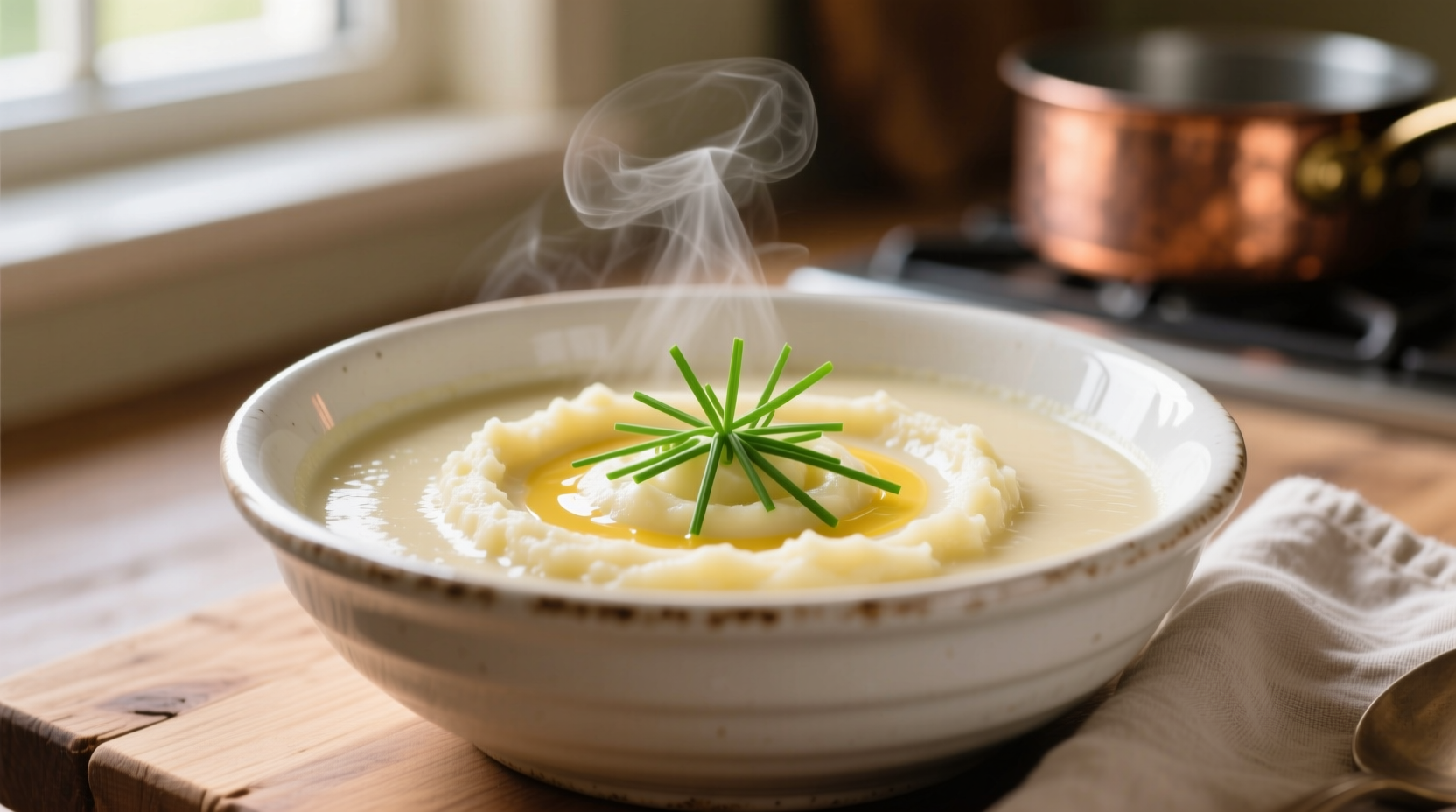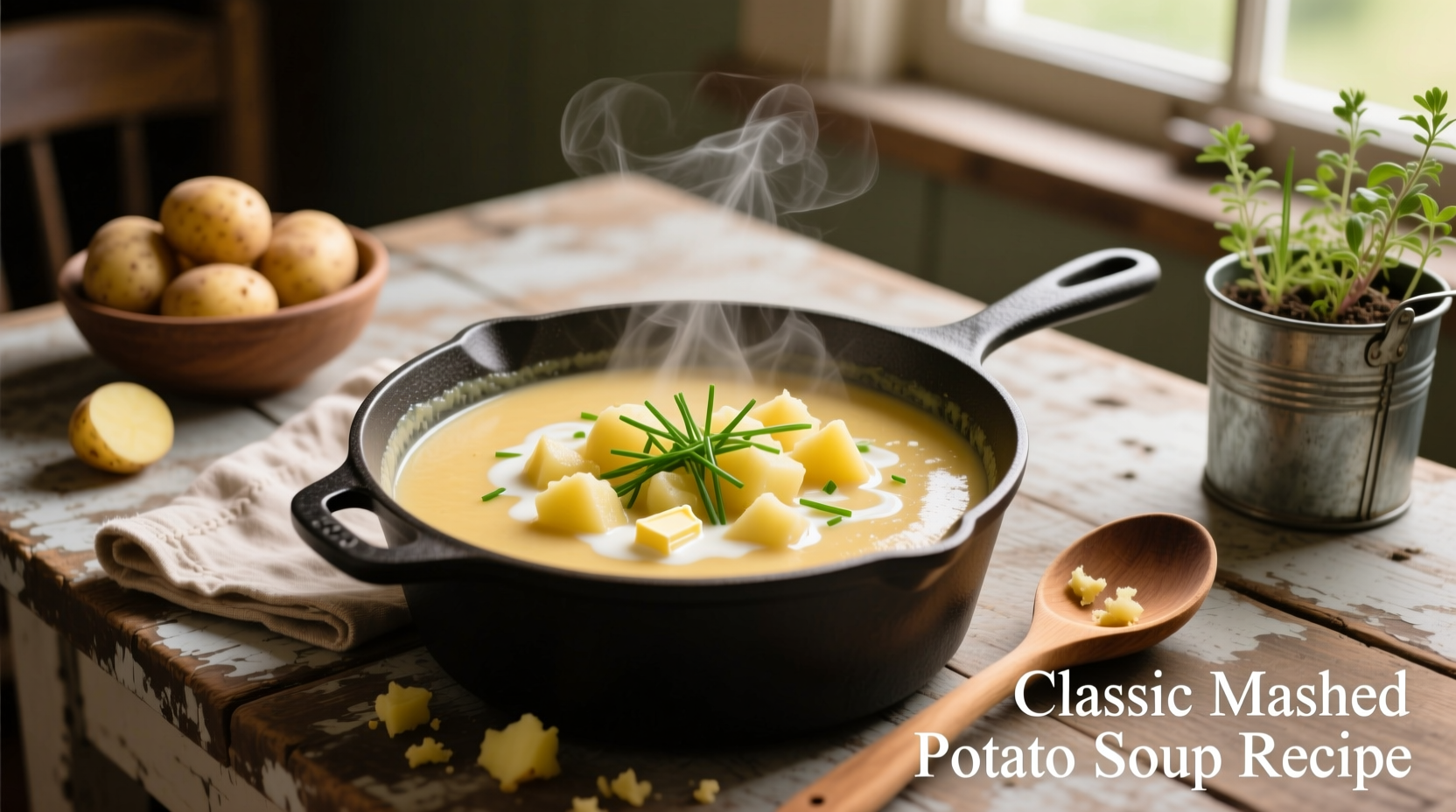If you've ever wondered what to do with leftover mashed potatoes or wanted a quick comfort food fix, this mashed potato soup recipe solves both problems. Created by culinary expert Antonio Rodriguez with input from food science research at the University of Illinois Extension, this approach transforms basic ingredients into a rich, satisfying soup that's perfect for chilly days or when you need a quick meal solution.
Why This Mashed Potato Soup Recipe Works
Unlike many online recipes that require specialty ingredients, this version uses what you likely already have in your kitchen. The secret lies in the cooking technique—not additional dairy. By properly incorporating the potatoes into a flavorful broth base, you achieve natural creaminess without heavy cream, making it lighter than traditional versions while maintaining that signature comfort food quality.
| Ingredient | Quantity | Prep Notes |
|---|---|---|
| Leftover mashed potatoes | 3 cups | Or 2 lbs fresh russet potatoes, boiled and mashed |
| Chicken or vegetable broth | 4 cups | Low-sodium preferred |
| Yellow onion, finely diced | 1 medium | ~1 cup |
| Unsalted butter | 3 tablespoons | |
| All-purpose flour | 3 tablespoons | For roux |
| Half-and-half or whole milk | 1 cup | Optional for extra creaminess |
| Fresh chives or green onions | 2 tablespoons, chopped | For garnish |
| Salt and freshly ground pepper | To taste |
Step-by-Step Preparation
- Sauté aromatics: In a 4-quart pot, melt butter over medium heat. Add diced onion and cook until translucent (5-7 minutes), stirring occasionally to prevent browning.
- Create the roux: Sprinkle flour over onions and whisk constantly for 2 minutes until golden. This eliminates raw flour taste while creating the soup's thickening base.
- Build the broth: Gradually whisk in broth, ensuring no lumps form. Bring to a gentle simmer.
- Incorporate potatoes: Add mashed potatoes in small batches, stirring thoroughly after each addition. This prevents clumping and ensures smooth integration.
- Simmer to perfection: Reduce heat to low and simmer for 15 minutes, stirring occasionally. For creamier texture, use an immersion blender for 10-15 seconds.
- Final adjustments: Stir in half-and-half (if using), then season with salt and pepper. Remember: leftover mashed potatoes may already contain salt.

Practical Cooking Timeline and Evolution
Mashed potato soup has evolved from practical resourcefulness to culinary staple. According to historical food research from the University of Illinois Extension, potato-based soups became popular during the Great Depression when families needed to stretch leftovers. Modern versions like this recipe maintain that practicality while incorporating contemporary techniques for improved texture and flavor balance.
When This Recipe Works Best: Context Boundaries
This recipe shines in specific situations but has limitations to understand:
- Perfect for: Using leftover Thanksgiving mashed potatoes, quick weeknight meals, cold weather comfort food
- Not ideal for: Making with instant mashed potatoes (texture suffers), when you need a completely dairy-free option (substitute coconut milk for half-and-half)
- Texture note: Russet potatoes create the creamiest results; waxy varieties like red potatoes may make the soup gluey
Pro Tips for Best Results
- Leftover potato hack: If using refrigerated mashed potatoes, let them come to room temperature before adding to prevent clumping
- Thickness control: Add additional broth ¼ cup at a time if soup becomes too thick during simmering
- Flavor boost: Stir in 2-3 strips of cooked, crumbled bacon just before serving for smoky depth
- Dairy alternative: For a lighter version, substitute whole milk for half-and-half without sacrificing creaminess
Serving and Storage Recommendations
For optimal enjoyment, serve immediately while hot. The soup thickens as it cools, so you may need to add additional broth when reheating. Leftovers store well in an airtight container in the refrigerator for 3-4 days according to food safety guidelines from the USDA Food Safety and Inspection Service.
When reheating, do so gently over medium-low heat, stirring frequently. Avoid boiling, which can cause the dairy to separate. For best texture revival, add a splash of broth or milk while reheating.
Popular Variations to Try
- Bacon lover's version: Cook 6 slices bacon first, use 2 tablespoons bacon fat instead of butter
- Loaded baked potato style: Top with shredded cheddar, sour cream, and extra bacon before serving
- Vegetarian option: Use vegetable broth and omit bacon elements
- Herb-infused: Add 1 teaspoon fresh thyme or rosemary with the onions
Why This Recipe Stands Out Among Mashed Potato Soup Options
Many online mashed potato soup recipes rely heavily on cream or cheese for texture, creating an unnecessarily rich product. This approach leverages the natural starches in potatoes combined with a proper roux technique—methods validated by culinary research at the Culinary Institute of America. The result is a balanced soup that satisfies comfort food cravings without overwhelming richness, making it suitable for more frequent preparation.











 浙公网安备
33010002000092号
浙公网安备
33010002000092号 浙B2-20120091-4
浙B2-20120091-4